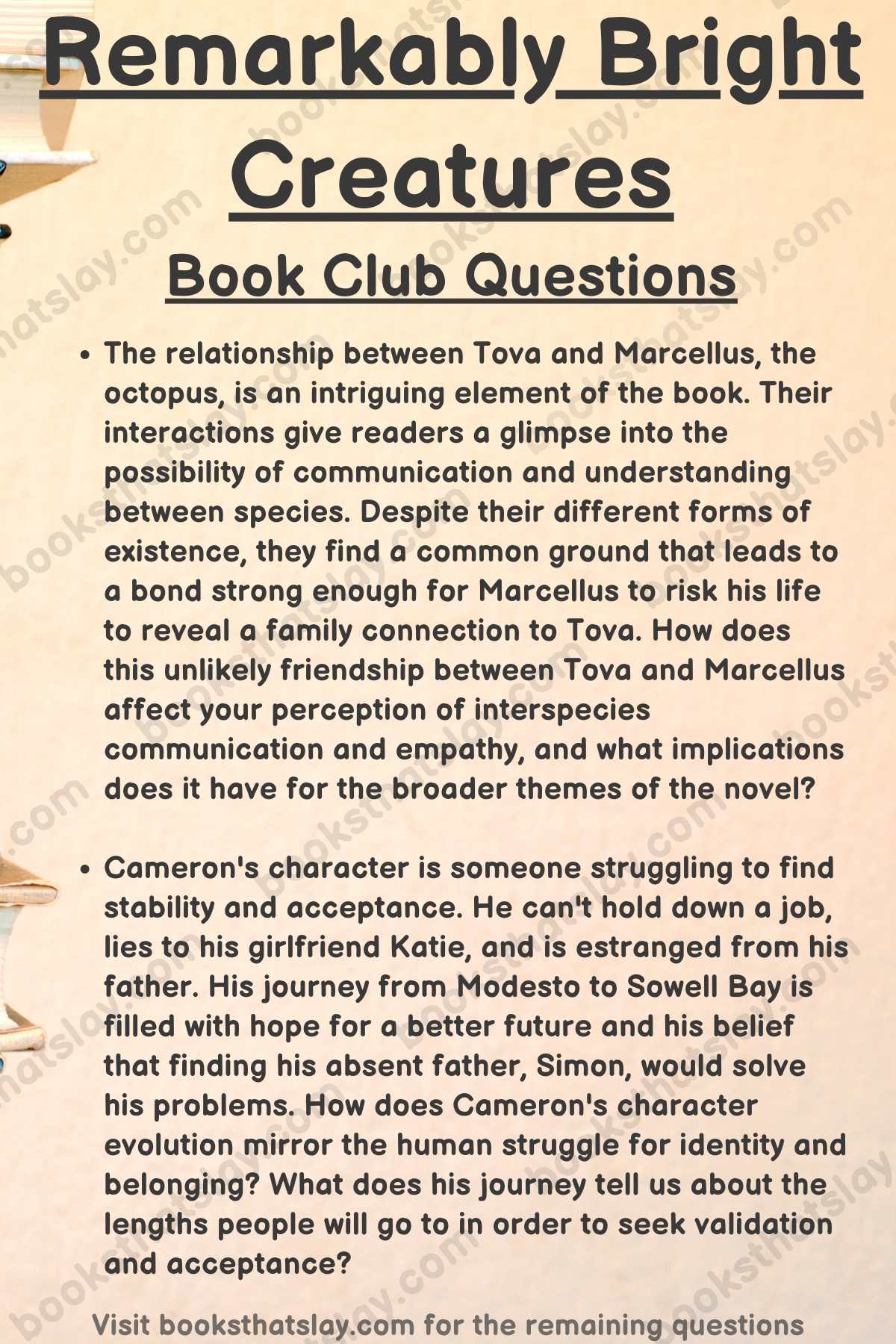10 Remarkably Bright Creatures Book Club Questions For Discussion
Dive deep into a story of uncommon friendship, hope, and second chances with “Remarkably Bright Creatures,” the debut novel by Shelby Van Pelt.
Meet Tova Sullivan, a widowed cleaner who finds solace in the quiet companionship of the late-night Sowell Bay Aquarium. There, an unlikely bond blossoms between Tova and Marcellus, a brilliant but grumpy giant Pacific octopus.
Tova carries a heavy secret: the unsolved disappearance of her son years ago. As she seeks answers, Marcellus becomes a surprising confidante, his intelligence and curiosity offering a glimmer of hope.
Let’s check out the book club questions now.

Remarkably Bright Creatures Book Club Questions For Discussion
- How does the unlikely bond between Tova and Marcellus, the octopus, reshape perceptions of interspecies communication and empathy? What broader thematic implications does this friendship hold within the novel?
- Tova’s journey through loneliness is a prevailing theme, punctuated by her interactions with various beings. How does her solitude and subsequent connections, both human and non-human, shed light on the human need for companionship? How does the novel explore this through Tova’s character development?
- In the novel, animals play dual roles as symbols and active participants, enriching the narrative with perspectives blending human and animal experiences. Marcellus, the octopus, embodies this fusion, while wolf eels represent fears and obstacles. Animals also reflect characters’ connections to the natural world, offering insights into their backgrounds and perspectives. How does each animal (Marcellus, wolf eels, frogs, sea lion statue, raccoon, and Cat) symbolically contribute to character development and understanding of identity and relationships?
- The mystery surrounding Erik’s death is a central narrative thread, challenging Tova’s perception of truth. How does the book handle the revelation of truth and its impact on characters and relationships? What does it suggest about the significance of truth in personal and interpersonal contexts?
- Marcellus McSquiddles serves as both a captivating character and narrative tool in the novel. How does his non-human perspective offer depth to the story and insight into other characters, particularly Tova? What does his journey signify about the universal quest for meaning and connection?
- Cameron’s journey from instability to seeking familial ties in the novel mirrors the human quest for identity and belonging. How does his character evolution reflect this struggle? What does his journey reveal about the human pursuit of validation and acceptance?
- Ethan Mack’s presence in the novel catalyzes transformative shifts in Tova and Cameron’s lives. Despite his seemingly stagnant demeanor, Ethan’s journey from loss to community involvement profoundly impacts those around him. How does Ethan’s backstory, his inclination to care for others, and his actions foster personal growth in Tova and Cameron? Furthermore, how does his character reinforce the narrative theme of found family’s significance?
- The book explores familial bonds, both biological and chosen, through Tova, Cameron, and Ethan’s evolving relationships. Tova, grappling with grief, finds unexpected family ties in her friendship with Ethan and her bond with Cameron. How does the novel suggest that family transcends biological connections, emphasizing chosen bonds? How does Cameron’s growth underscore this theme throughout the story?
- Aging and mortality are central themes in the novel particularly evident in Tova’s character. Tova navigates past losses, the realities of aging, and fears of burdening loved ones. How does Tova’s journey toward accepting her mortality shape the narrative? How does her relationship with Marcellus, a character facing similar concerns, aid in this acceptance?
- The environment and non-human entities, such as the aquarium and Marcellus, significantly influence the novel, functioning not just as settings but as active agents in the plot. How do these non-human elements contribute to the exploration of interconnectedness and agency? In what ways does their involvement challenge conventional human-centric narratives?